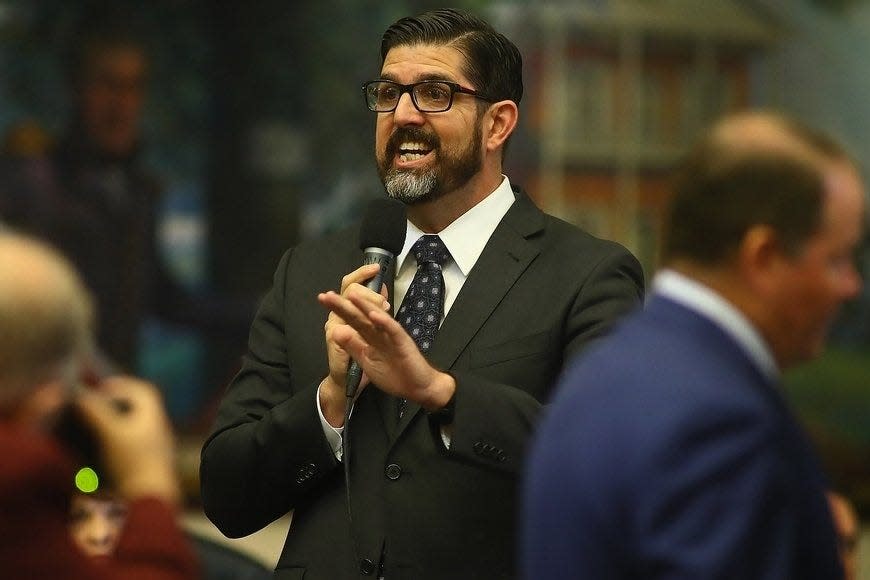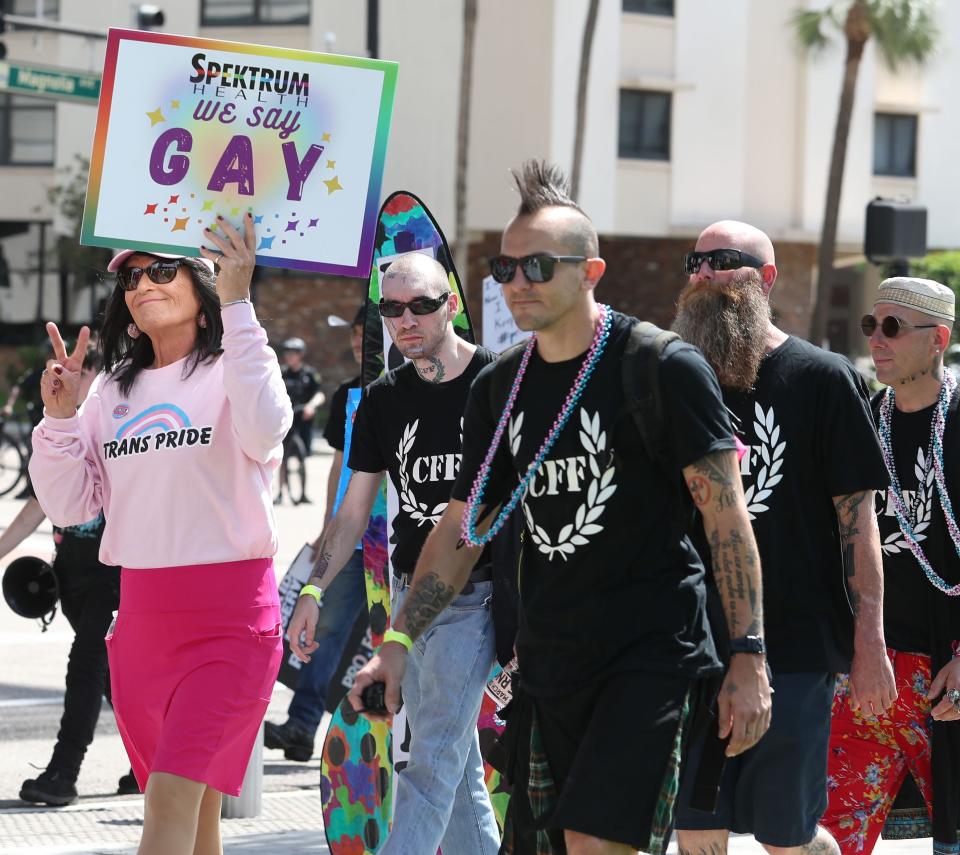Board of Education: Segregate bathrooms by birth-assigned sex at cosmetology, other schools
Sebastian Cook is pursuing his dream of becoming a barber. Some days, he spends up to 12 hours at the Brevard-based academy he attends. With a rule passed Wednesday by the Florida Board of Education, the 19-year-old transgender man will be barred from accessing a bathroom he feels comfortable using.
"It makes me really terrified to go to school," he said. "I am not a woman. I don't look like a woman. More women will be uncomfortable with me in their restroom when most men don't even realize I'm trans when I use the restroom."
The rule, passed unanimously by the seven-member board, enacts language laid out in House Bill 1521, which states that bathrooms and changing facilities must be segregated by sex assigned at birth.
Similarly to a rule passed in August, which applied to schools in the Florida College System, the new rule says that post-secondary educational facilities licensed by the Commission for Independent Education and certain other institutions must segregate bathrooms and changing facilities by sex assigned at birth or provide a unisex option. Student and employee handbooks, codes of conduct and disciplinary procedures must lay out these new rules and establish disciplinary procedures for students, staff and faculty who use the "wrong" bathroom.

These documents should provide those at the institution with notice that they have a right to file a complaint with Florida's attorney general alleging the institution has failed to meet the requirements for bathrooms under Florida statute.
These rules apply to all facilities on campus, including student housing facilities owned or operated by the institution.
Institutions have until April 2024 to provide the Department of Education with proof that they are in compliance with the new rule.
Where does the rule apply?
The rule applies to colleges and universities licensed by the Commission for Independent Education — such as cosmetology schools, certain health-related career academies, bartending schools and more — as well as certain institutions not under the jurisdiction of the commission. These institutions include:
Postsecondary institutions operated at the state, political subdivisions or the federal government.
Any college or course approved for operation under part of the Florida Statutes requiring licensing or approval.
Institutions that are under the jurisdiction of the Department of Education, eligible to participate in the William L. Boyd, IV, Effective Access to Student Education Grant Program and that are nonprofit independent colleges or universities located and chartered in the state and accredited by the commission on Colleges of the Southern Association of Colleges and Schools to grant baccalaureate degrees.
Institutions that offer only avocational programs or courses, exam prep programs, contract training programs, continuing education or professional development courses.
Institutions that were exempt from licensure in 2001 under Florida statute so long as they have maintained their qualifying criteria.
Religious colleges that annually verify by sworn affidavit that the name of the institution contains a religious modifier or religious-themed name, the institution offers only religious educational programs, the titles of degrees the institution offers can't be confused with secular degree titles and must include a religious modifier, the duration of degree programs offered is consistent with standards of the commission and the institution's consumer practices are consistent with state statute.
The rule does not apply to schools like Florida Tech or Embry–Riddle Aeronautical University, as they are not licensed by the Commission for Independent Education and do not fall under the other criteria listed in the rule.
The rule also does not apply to Florida's state universities like University of Florida, Florida State University and University of Central Florida.
Bathrooms more unsafe for trans people: 'Felt like prey': Bathrooms more unsafe under new Florida law, trans people say
Fireable offense: New Florida rule for college staff: Use bathroom of your sex assigned at birth or be fired
'Why is it being politicized?'
Two public commenters spoke on the rule, with one woman saying that institutions don't have enough unisex facilities for trans and nonbinary students, staff and faculty.
"We have a situation whereby all the nonbinary and transgender (students) and the teachers all line up for this unisex bathroom," she said. "They need more than one bathroom."
The other commenter, Yvette Benarroch, chair of Collier County's chapter of Moms for Liberty, spoke in support of the rule.
"Our core belief is that every student deserves to learn and thrive in an environment where they feel safe, respected and protected," she said. "The designation of restrooms and changing facilities in a private post-secondary educational facility, as determined at birth by biological sex, isn't about discrimination. It's about safety and clarity."
State Rep. Anna Eskamani told FLORIDA TODAY that she felt the board's focus on private institutions was alarming.
"The fact that we see the Board of Education, via legislature, attempt to craft policy and rules for private institutions is very alarming and unsettling," she said. "No matter your position when it comes to LGBTQ+ rights, you should be disturbed by that because that is government getting involved in our private institutions, and our private lives."
For Cook, the new rule will take away his ability to safely use the bathroom at school, he said.
"I just don't understand why people are so concerned with where I pee," he said. "My genitalia is no one's business, so why is it being politicized?"
Similar rules at other colleges and universities
This is the second rule to be approved that impacts post-secondary educational facilities, with a third set to be approved in November by the Florida Board of Governors.
At an August meeting, the board of education unanimously voted to require 28 state colleges within the Florida College System to adhere to a rule similar to the one passed Wednesday. Like the latest rule, it required them to segregate facilities by sex at birth for employees and students, as well as expanding the rule to student housing. Unlike Wednesday's rule, it also mandated termination for an employee with two offenses.
There's another rule set to be voted on in November that will impact schools like University of Florida, Florida State University and University of Central Florida.

The Board of Governors, who oversee Florida's universities, will vote on a regulation that segregates restrooms and changing facilities by sex assigned at birth and makes it a fireable offense if a trans employee uses a restroom that aligns with their gender identity.
If approved, universities will be required to update their student codes of conduct and disciplinary procedures for employees by April 1, 2024.
The rule is slightly less strict than the state board of education's rule for colleges, as it does not require an employee be terminated after a certain number of offenses. However, while not mandatory, dismissal remains an option.
Finch Walker is the education reporter at FLORIDA TODAY. Contact Walker at 321-290-4744 or fwalker@floridatoday.com. X: @_finchwalker
This article originally appeared on Florida Today: Board expands rule segregating school facilities by birth-assigned sex

